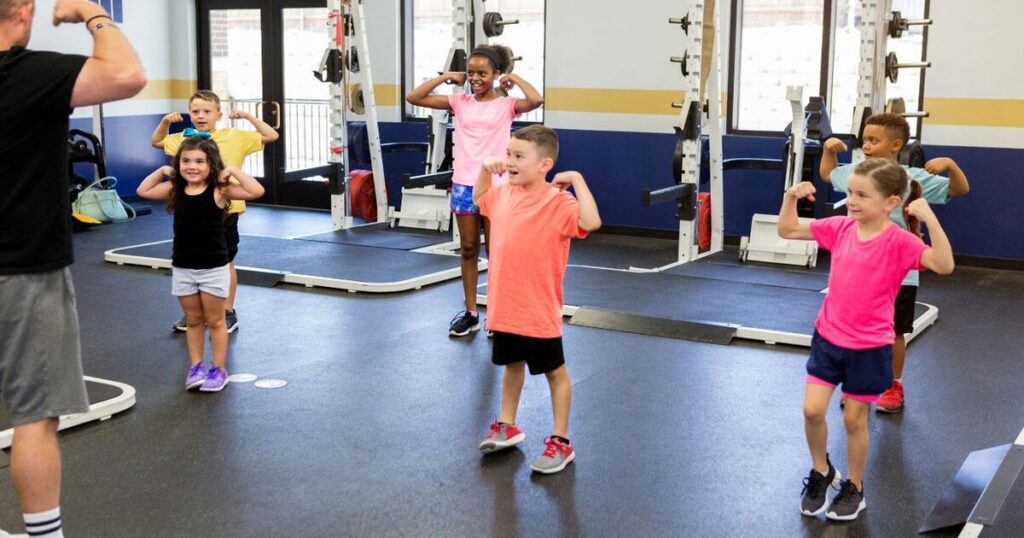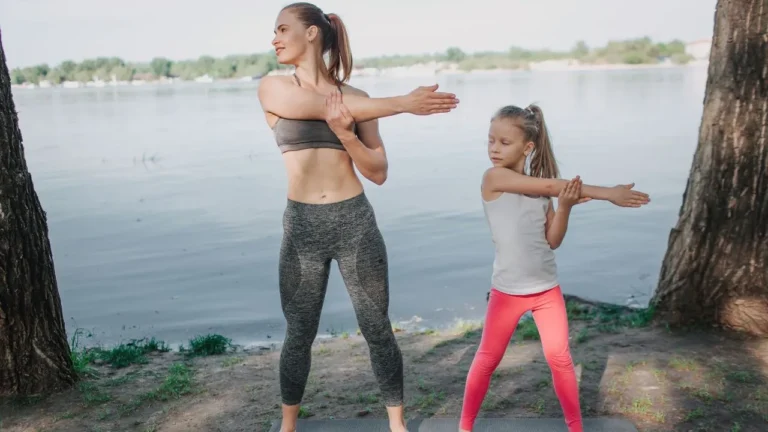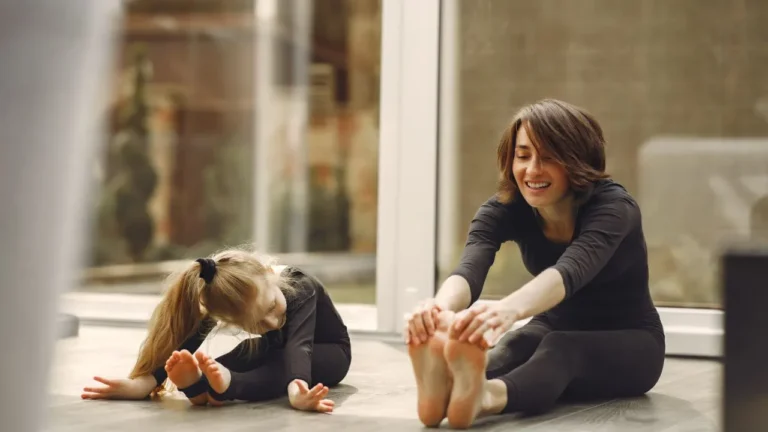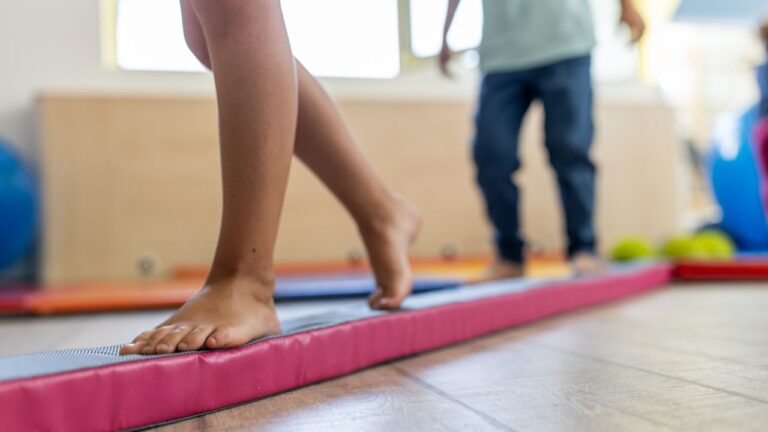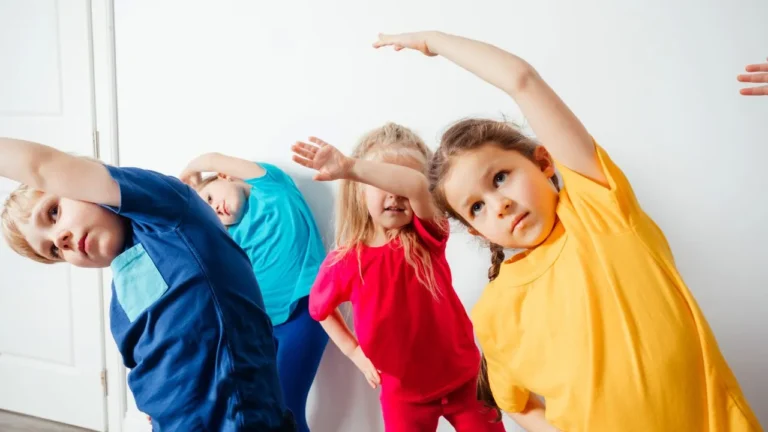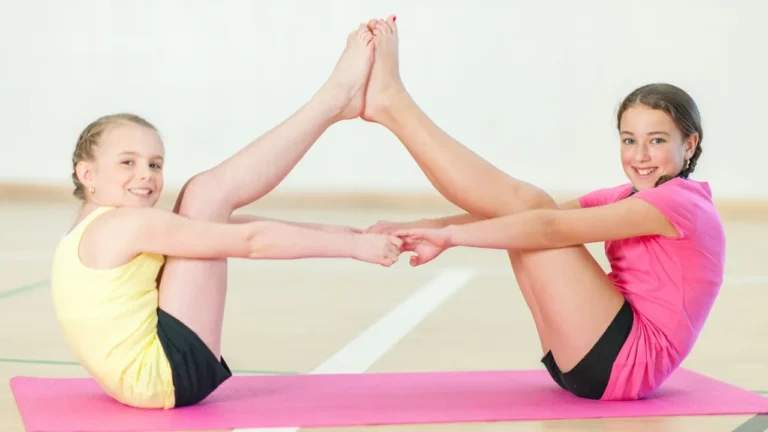Wondering When Can My Kids Go To The Gym?
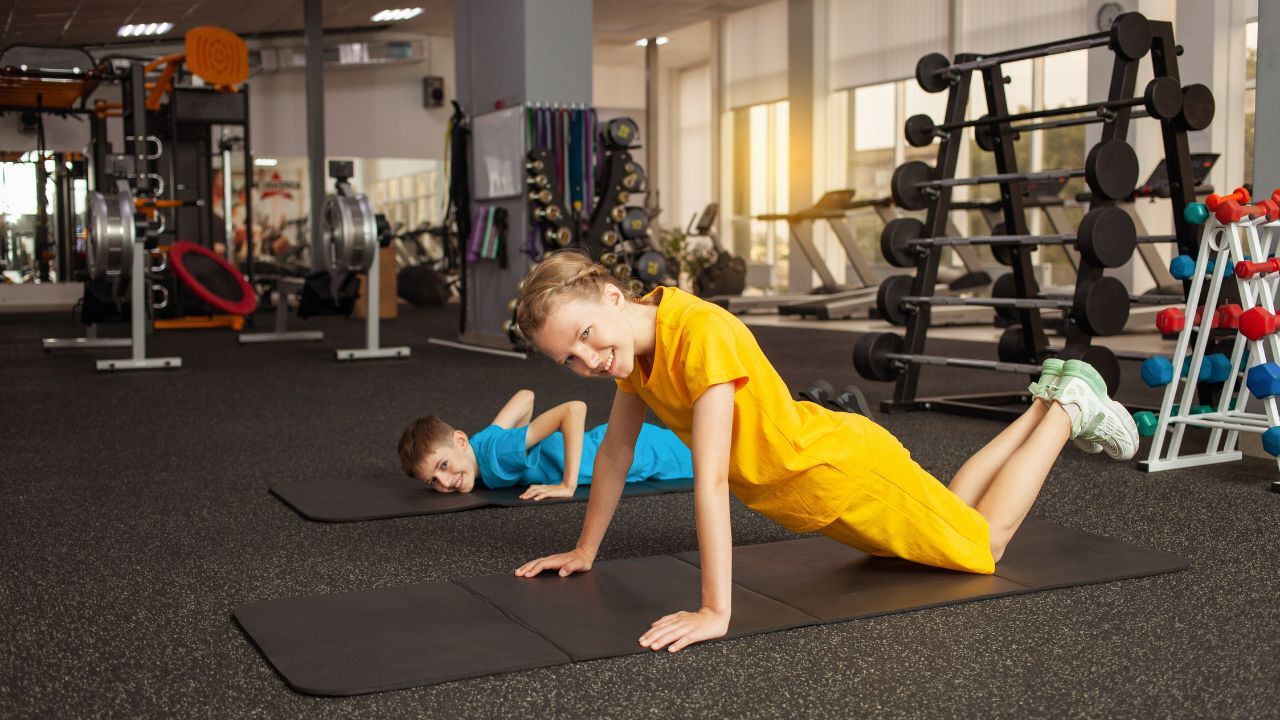
Ever caught your child mimicking your dumbbell curls or joining you during a home workout session? It’s adorable, but it also sparks an important question: When is the right time to graduate your child from living room lunges to a structured gym environment?
When can my Kids go to the gym? “Cardio isn’t age-restricted, and basic bodyweight exercises like push-ups or planks can be introduced early on,” advises Dr. Alfred Atanda, a pediatric orthopedic surgeon. However, before you envision your 8-year-old deadlifting, it’s crucial to recognize that weightlifting should generally be a teen-only zone to prevent injury, adds Dr. Mark Mandel, a Montvale-based pediatrician.
Safety can’t be overstated. Gone are the days when strength training was considered off-limits for young ones, but it’s imperative that all gym activities are adequately supervised.
So, if your child has been dropping hints about wanting a gym membership, or simply showing a keen interest in fitness, you’re in the right place. This article will explore whether your child is ready for the gym, how to make their workouts both fun and age-appropriate, and most importantly, how to instill a lifelong love for exercise.
Ready to dive in? Let’s unravel the complexities of introducing your child to the world of fitness.
The Age Spectrum: Not Just a Number
Benefits of Knowing When Kids Go to the Gym
Ever noticed how a game of tag can instantly lift a child’s spirits? Physical activity does wonders, and the gym offers an organized setting for those benefits to blossom. The gains are not just muscular; they’re holistic. From fortified bones to reduced risks of chronic illnesses like heart disease and obesity, the benefits are comprehensive.
But let’s take a moment to talk about the less obvious perks, mental and emotional well-being. Dr. Mandel points out that regular exercise isn’t just about maintaining a healthy body; it’s also about cultivating a healthy mind. Research confirms that exercise can elevate mood, enhance focus, and even improve coping skills. You see, it’s not just about flexing muscles but also about fortifying the mind.
Bear in mind, though, that the gym is not the sole sanctuary for fitness. The end goal is an active lifestyle, which can be achieved through various means, be it team sports, dance classes, or good old-fashioned play. So whether it’s a formal gym setting or a spontaneous game of frisbee in the park, the key is to keep the body, and by extension, the mind, in motion.
Why the Gym is More Than Just a Physical Space
Exercise is a proven mood booster and can even help in academic performance. So, next time your child balks at gym time, remind them it might make math homework easier!
Signs Your Child Is Gym-Ready
If you’ve got a first or second-grader who prefers doodling to dodgeball, you might wonder, “Is the gym a good fit?” According to Dr. Mandel, with proper supervision, even young kids can benefit from a structured fitness environment.
But what’s the rush, you ask? Meghan Walls, a pediatric psychologist, explains that establishing good habits early on is a game-changer. Kids who get a head start in physical activity tend to stick with it as they grow older. And let’s be honest: In a world of screens and sedentary lifestyles, fostering active habits is more crucial than ever.
That said, the gym isn’t the only pathway to an active life. If your child is self-conscious about their body, perhaps a family hike or bike ride would be a more positive introduction to physical activity. The key is to find an approach that makes your child feel empowered, not self-conscious.
Responsibility also plays a role. Kids are naturally curious, sometimes to a fault. Dr. Walls notes that a child’s risk-taking tendencies could make a gym setting less ideal for them. The question to ask yourself is, “Is my child responsible enough for a gym environment?”
If your youngster is gung-ho about getting a gym membership, sit down and have a heart-to-heart. What are their fitness goals? How often do they plan to go? Is a body-positive trainer an option? If their answers seem uncertain, perhaps it’s wiser to direct them toward more structured activities like classes or team sports.
So, you see, readiness for the gym is not a one-size-fits-all criterion. It’s a blend of emotional maturity, physical capability, and yes, a sprinkle of enthusiasm. Your job is to recognize the signs and guide your child accordingly. How ready do you think your child is?
Readiness Checklist: It’s More Than Just Age
Safety Tips for Kids’ Workouts
Remember the time when we believed too much lifting would stunt a child’s growth? Well, we’ve come a long way. “It’s almost a non-issue if the weight program is thoughtfully designed and supervised,” says Dr. Mandel. Still, how do you ensure that the gym remains a safe space for your child?
Tailored Workouts Over Cookie-Cutter Programs
Dr. Atanda advises against one-size-fits-all programs like CrossFit for kids. Instead, aim for a plan tailored to your child’s unique needs—age, size, cognitive development, and personal fitness goals. The focus should be on self-improvement, not outdoing the kid on the next treadmill. Competitiveness can push a child to a dangerous edge.
Tools of the Trade: The Right Equipment
Just as you wouldn’t give a toddler an adult-sized bike, make sure gym equipment fits your child’s size and age. Can’t reach the pedals on a stationary bike? Opt for an elliptical or a treadmill instead. Start with bodyweight exercises like push-ups and squats, focusing on form overweights. As they progress, introduce light free-weights and resistance bands.
The Watchful Eye: Supervised Strength Training
Whether it’s you or a certified trainer, supervision is non-negotiable. Keep an eye on the reps, monitor the form, and watch the usage of equipment. Dr. Atanda suggests parents or trainers should demonstrate new exercises, observe the child performing them, and correct form as needed.
Fueling the Engine: Nutrition and Hydration
A light, nutritious snack before the workout and regular sips of water during the session can make a world of difference. Dr. Atanda points out that while it may sound like a no-brainer, kids often need reminders to stay hydrated.
Breaks Are Not for the Weak: Rest and Recovery
Don’t let enthusiasm morph into exhaustion. Dr. Atanda warns against long, grueling workout sessions for kids, emphasizing that they may need breaks more often than adults. And yes, insist on rest days between strength training sessions.
Health Check: The Non-Negotiables
Dr. Mandel advises parents to consult a pediatrician before initiating any new fitness program for their kids, especially if they have pre-existing conditions like hypertrophic cardiomyopathy. It’s better to be safe than sorry.
Choosing the Right Gym for Your Child
You wouldn’t just pick any school for your child, would you? The same level of care should be applied when selecting a gym. Look for a place that not only allows young members but also has trainers experienced in working with children. Trust me, a welcoming atmosphere can make all the difference in your child’s fitness journey.
The Power of a Peer Group
If the gym offers specialized classes for kids, consider it a win-win. Dr. Walls points out that achieving goals with peers can be incredibly motivating for children. It’s not just about the endgame of getting fit; it’s also about the journey and the sense of accomplishment that comes along with it.
Group Class or Individual Training?
Now, if you’re leaning towards enrolling your child in a group class, make sure it’s designed for kids. The last thing you want is for your child to feel overwhelmed by adults. And here’s a golden nugget for you—before stepping into that class, remind your child that everyone’s fitness journey is personal. Maybe the kid next to them can do more push-ups, and that’s perfectly fine.
So, as you embark on this quest to find the perfect gym for your child, keep these pointers in mind. It’s not just about the equipment or the location; it’s about finding a space where your child feels comfortable, motivated, and ready to grow, both physically and emotionally. Have you found that space yet?
The Must-Have Checklist for Gym Selection
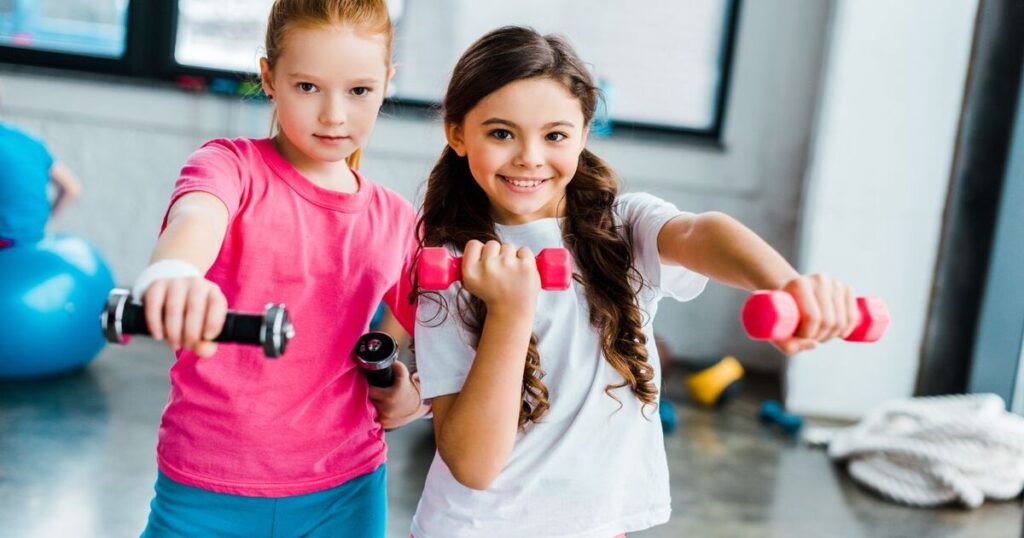
Talking to Your Kids About Exercise
You’ve found the perfect gym, but have you thought about how to introduce this new chapter to your child? The words you choose can shape their entire perception of exercise. Dr. Walls emphasizes, “Be mindful of your language; it’s more influential than you think..”
Words That Uplift, Not Weigh Down: Instead of portraying the gym as a place to ‘burn off that extra slice of pizza,’ why not describe it as a playground for becoming stronger and healthier? Exercise should feel like a celebration of what our bodies can do, not a penance for what we ate. Keep the narrative around fitness positive, steering clear of any talk that reduces it to mere weight loss or muscle gain.
The Instagram Illusion Keep It Real: Here’s another pro tip, warn your kids about the often unrealistic images they’ll encounter on social media. “Don’t let them fall for the filtered versions of fitness they see online,” advises Dr. Walls. Remind them that Instagram is not the benchmark for how one should look or feel.
The Echo of Home: Your Words Resonate: Finally, remember that your voice becomes their inner voice. Dr. Walls points out, “What’s said at home holds more weight than anything they’ll hear at the gym.” If the family talk revolves around shedding pounds or bulking up, those messages get internalized by your child. So, as you guide your child through this new adventure, let your words be the wind beneath their wings, not a weight around their ankles. How will you frame the conversation around your child’s new fitness journey?.
Final Thoughts
So, there you have it; a comprehensive guide to navigate the labyrinth of questions you might have about introducing your child to the world of fitness and gyms. This isn’t just about physical activity; it’s a roadmap for holistic well-being, something that will stand them in good stead for life.
Is your family ready to embark on this transformational journey? If you’ve made it this far in the article, I’m guessing the answer is a resounding “Yes!” Thank you for allowing me to be part of this important chapter in your family’s life.
Your child’s well-being is worth every drop of sweat and every moment spent in preparation. Here’s to a healthier, happier future for our young ones!

